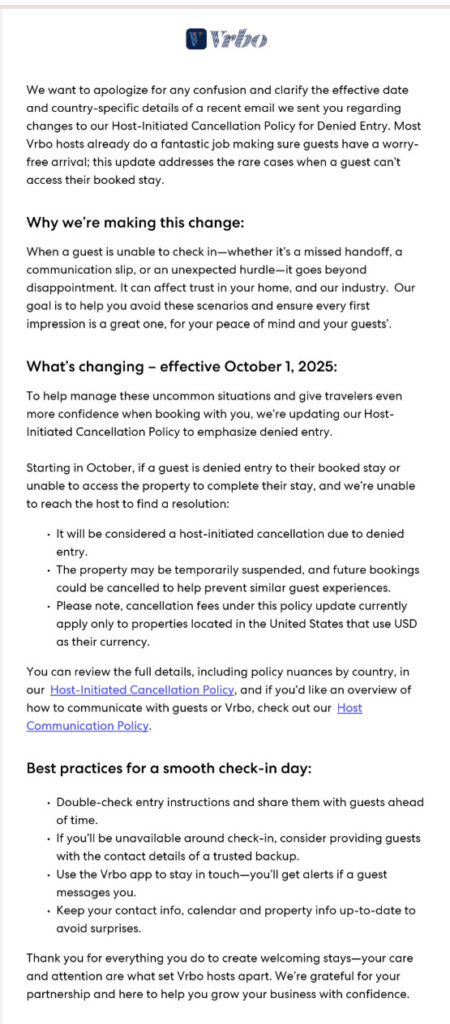When guests arrive at a property and can’t get in, it’s more than a bad first impression. It’s a breach of trust. Vrbo is making that clear with an updated Host-Initiated Cancellation Policy that sets out strict financial penalties and response-time rules for hosts.
For guests, these changes come wrapped in a reassuring promise: Vrbo’s Book with Confidence Guarantee. But for hosts, especially professional managers running hundreds of listings, the fine print means more risk, and more responsibility.
Updated Vrbo Host-initiated Cancellation Policy: Tiered Penalties
Vrbo Host-initiated Cancellation Policy (updated October 2025) introduces a tiered fee structure for cancellations and denied entry:
- 10% of reservation value if canceled more than 30 days out.
- 25% if canceled 2–30 days before check-in.
- 50% if canceled within 48 hours of check-in.
- 100% if canceled at check-in, the host is unresponsive in violation of the communications policy, or the guest is denied entry without cause.
Fees apply only to U.S. listings priced in USD, with deductions taken directly from payouts. Integrated Property Managers (IPMs) receive invoices for cancellation fees. Repeated failures can trigger 7-day listing suspensions, blocked calendars, or even loss of Premier Host status.
Vrbo does allow waivers for force majeure events, government restrictions, safety emergencies, or suspected fraud. But the burden is on the host to request and prove eligibility within 10 days.
Communication Becomes Compliance
The new Host Communications Policy ties penalties directly to host responsiveness. Starting January 2025, hosts must:
- Provide check-in instructions at least 72 hours before arrival.
- Provide full access instructions before check-in time.
- Respond to “critical stay information” questions (health/safety, key amenities, accessibility) within:
- 24 hours (5+ days before stay)
- 12 hours (1–4 days before stay)
- 1 hour on the day of check-in (8am–9pm local time).
If Vrbo doesn’t receive the required information and can’t reach the host, it may cancel the booking, refund the guest, and apply cancellation penalties. In other words, communication lapses aren’t just bad service, they’re now classified as cancellations.

The message explains an update effective October 1, 2025, that focuses on rare cases where guests are unable to check in. Vrbo clarifies that if a guest is denied entry and can’t reach the host, it will count as a host-initiated cancellation
Guest-Facing: The Book with Confidence Guarantee
For travelers, all this complexity is distilled into the Book with Confidence Guarantee. Marketed as a simple promise, it covers:
- Denied entry if a host wrongfully refuses access.
- Fraud (e.g., hijacked listings or off-platform payment scams).
- Material defects (like misrepresented bedrooms or unsafe conditions).
- Owner cancellation within 30 days of arrival.
In these cases, Vrbo pledges to refund payments or find emergency alternative accommodations, sometimes covering costs itself.
This guest-first branding is where Vrbo differs from its rivals. Hosts see a tiered penalty system and stricter obligations, while guests see a safety net. Both are true, but the emphasis depends on which side of the marketplace you’re in.
How Airbnb and Booking.com Compare
Vrbo isn’t alone in tightening policies. Here’s how the three platforms stack up:
| Platform | Guest Protection | Host Consequences | Enforcement Style |
| Vrbo | Book with Confidence Guarantee promises refunds, rebooking, and support if guests are locked out, misled, or scammed. | Tiered cancellation fees (10%–100%), payout deductions, suspensions, loss of Premier Host. Communication failures treated as cancellations. | Heavy emphasis on structured penalties + strict comms rules to align guest experience and host accountability. |
| Airbnb | Rebooking & Refund Policy: “Reservation Issues” (host cancels, denied access, unsafe/uninhabitable property) trigger refunds or rebooking. | Hosts lose payouts or have payouts reduced. Cases reviewed with evidence; hosts can dispute claims. | More case-by-case investigation and flexibility, less rigid fee schedule. |
| Booking.com | Guest never pays more: if property unavailable, host must rehouse guest in equal/better lodging. Platform invoices hosts if it intervenes. | Host pays relocation costs, may still owe commission, and risks suspension for failures. | Focus on operational obligations: strict relocation timelines, key access rules, communication reply scores. |
What’s worth noting is that while the platforms refund the guest in full, they may still keep their commission. That means the host could end up paying out-of-pocket for both the refund and relocation, while the booking platform profits on a stay that never happened.
Host Reactions: “Punitive” or “Overdue”?
On Reddit, hosts were split. Some saw Vrbo’s update as an overreach:
- “What if a guest doesn’t read the instructions or goes to the wrong house?”
- “Expecting 24/7 availability is unrealistic. We’re not hotels.”
Others welcomed the change:
- “No excuse not to let a guest in. If you can’t manage that, you shouldn’t be hosting.”
- “This stops hosts from canceling to chase higher-paying bookings.”
Many pointed to gray areas, like what counts as a “reasonable” delay, or how disputes will be handled. Others worried about abuse by guests who might exploit vague terms. The common thread: clarity matters, and Vrbo still has work to do.
Why Now? Guest Trust and Platform Reputation
The stricter rules aren’t only about operational reliability. They’re about signaling trust at a time when short-term rental platforms are under pressure from both regulators and wary travelers.
The rise of AI-generated scams, fake listings, and safety incidents has made guests more skeptical. Vrbo, Airbnb, and Booking.com are responding by showing regulators and consumers that they’re enforcing accountability. Vrbo’s tiered fees and Book with Confidence branding are part of that: a host-facing stick, guest-facing shield.
What Property Managers Should Take Away
For professional managers, these policies go beyond compliance hurdles to being competitive signals.
- Operational readiness matters more than ever. Smart locks, backup contacts, automated comms, and reliable channel managers are no longer nice-to-haves.
- Trust is now a selling point. Platforms are betting that visible enforcement will reassure guests. Managers who can demonstrate seamless check-in and consistent service can use that same message in their own marketing.
- At scale, risk grows. A small host might avoid issues by handling guests personally. For managers running 50+ units, the risk of one missed message or failed code is higher — and so are the consequences.
The Bottom Line
Vrbo, Airbnb, and Booking.com are converging on one principle: if a guest can’t get in, the host is responsible, financially and operationally.
Vrbo’s layered approach — penalties, comms deadlines, and a guest-facing guarantee — shows how platforms are tightening the screws on hosts while broadcasting trust to travelers. For professional property managers, the message is clear: operational discipline is no longer optional. In an industry where guest trust is currency, reliability is the product you’re really selling.
Uvika Wahi is the Editor at RSU by PriceLabs, where she leads news coverage and analysis for professional short-term rental managers. She writes on Airbnb, Booking.com, Vrbo, regulations, and industry trends, helping managers make informed business decisions. Uvika also presents at global industry events such as SCALE, VITUR, and Direct Booking Success Summit.








